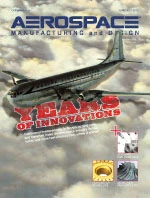Aerospace is all about converting energy into flight, and it takes a lot of energy to enable and maintain flight. The source of choice for aerospace energy is hydrocarbon fuel. Hydrocarbon fuel is inexpensive, readily available, and has the desirable high energy-to-volume density for aerospace applications. Hydrocarbon fuels are likely to be powering our aircraft into the foreseeable future. Currently, petroleum is by far the largest source for aerospace hydrocarbon fuel. However, much of this petroleum comes from foreign entities that may be subject to political turmoil, or tempted to use their supply to achieve political objectives. Many of us are old enough to remember the disruptive effects on our economy and our personal lives of the foreign oil supply fluctuations in 1973 and 1979. Having secure, reliable, and affordable sources of energy for aerospace to keep our military and civilian airplanes flying is a legitimate national security issue. Petroleum is a non-renewable source for aerospace hydrocarbon fuels, leaving a significant carbon footprint.
But, petroleum is not the only source of hydrocarbons for aerospace fuel. Due to a lack of access to oil, the Germans turned to coal-based fuels in World War II, as did South Africa during the apartheid era. Natural gas can also serve as a source of hydrocarbons for fuel. Plants are also made of hydrocarbons, and plant-based bio-fuels offer an attractive, sustainable source of hydrocarbons for aerospace fuel, with the added benefit of a reduced carbon footprint.
Bio-fuels face many challenges to become a significant source of aerospace fuel. Perhaps the biggest challenge is cost – the cost of bio-fuel must come down to be competitive with petroleum-based fuels. Bio-fuels must show that they are compatible with the existing aviation fuel infrastructure – pipes, pumps, tanks, fuel systems, seals, gaskets, and jet engines. Reliability, maintainability, emissions, and performance of the fuel system, engine, and airplane must be shown to be equal to, or better than, today’s petroleum fueled systems. The source of the bio-fuel should minimize or mitigate negative environmental and market effects. The experience of ethanol-based fuel driving up the cost of a food source (corn) provides a useful example of such an effect.
NASA, the Department of Defense, the FAA, the Department of Energy, and industry, among others, are working together to address these challenges. Much work involves algae, a very attractive hydrocarbon source for aerospace fuels. Algae are fast growing, grow in a wide variety of climates and locations, and do not compete with food crops. Algae are an efficient and effective processor of solar energy into stored hydrocarbon chemical energy.
With high yields and fast growth, algae require far less acreage to produce sufficient quantities of aerospace fuel feedstock than other crops. Even in a temperate state like Ohio, algae can be grown year round in the cooling ponds adjacent to coal-fired power plants. Carbon dioxide enhances algae growth, so flue gas from such plants can be piped into the ponds, capturing the carbon dioxide and increasing the algae yield. Algae based aviation fuels have been shown to be very compatible with today’s jet aircraft and fuel distribution systems, with no performance degradation. The economics of algae-based aviation fuel production are improving, and I am convinced that algae-based bio-fuel will be a significant source of aerospace fuel for our country, contributing to our national security and economic health. Algae can be the secure, reliable, and affordable source of energy to help meet our nation’s aerospace needs.
Cleveland, OH
oai.org

Explore the June July 2010 Issue
Check out more from this issue and find your next story to read.
Latest from Aerospace Manufacturing and Design
- AAMI project call submission deadline extended to May 12
- Jergens launches cast iron tooling column additions
- Airbus to acquire assets relating to its aircraft production from Spirit AeroSystems
- FANUC America's Cobot and Go web tool
- Chicago Innovation Days 2025: Shaping the future of manufacturing
- High-density DC/DC converters for mission-critical applications
- #59 - Manufacturing Matters: Additive manufacturing trends, innovations
- ACE at 150: A legacy of innovation and industry leadership





